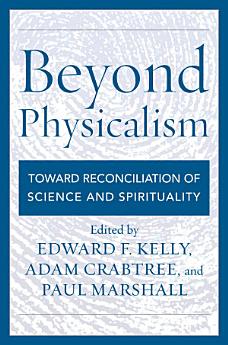Beyond Physicalism: Toward Reconciliation of Science and Spirituality
Edward F. Kelly · Adam Crabtree · Paul Marshall
ফেব ২০১৫ · Rowman & Littlefield
৫.০star
১টি রিভিউreport
ই-বুক
634
পৃষ্ঠা
family_home
উপযুক্ত
info
reportরেটিং ও রিভিউ যাচাই করা হয়নি আরও জানুন
এই ই-বুকের বিষয়ে
The rise of modern science has brought with it increasing acceptance among intellectual elites of a worldview that conflicts sharply both with everyday human experience and with beliefs widely shared among the world’s great cultural traditions. Most contemporary scientists and philosophers believe that reality is at bottom purely physical, and that human beings are nothing more than extremely complicated biological machines. On such views our everyday experiences of conscious decision-making, free will, and the self are illusory by-products of the grinding of our neural machinery. It follows that mind and personality are necessarily extinguished at death, and that there exists no deeper transpersonal or spiritual reality of any sort.
Beyond Physicalism is the product of an unusual fellowship of scientists and humanities scholars who dispute these views. In their previous publication, Irreducible Mind, they argued that physicalism cannot accommodate various well-evidenced empirical phenomena including paranormal or psi phenomena, postmortem survival, and mystical experiences. In this new theory-oriented companion volume they go further by attempting to understand how the world must be constituted in order that these “rogue” phenomena can occur. Drawing upon empirical science, metaphysical philosophy, and the mystical traditions, the authors work toward an improved “big picture” of the general character of reality, one which strongly overlaps territory traditionally occupied by the world’s institutional religions, and which attempts to reconcile science and spirituality by finding a middle path between the polarized fundamentalisms, religious and scientific, that have dominated recent public discourse.
Contributions by: Harald Atmanspacher, Loriliai Biernacki, Bernard Carr, Wolfgang Fach, Michael Grosso, Michael Murphy, David E. Presti, Gregory Shaw, Henry P. Stapp, Eric M. Weiss, and Ian Whicher
Beyond Physicalism is the product of an unusual fellowship of scientists and humanities scholars who dispute these views. In their previous publication, Irreducible Mind, they argued that physicalism cannot accommodate various well-evidenced empirical phenomena including paranormal or psi phenomena, postmortem survival, and mystical experiences. In this new theory-oriented companion volume they go further by attempting to understand how the world must be constituted in order that these “rogue” phenomena can occur. Drawing upon empirical science, metaphysical philosophy, and the mystical traditions, the authors work toward an improved “big picture” of the general character of reality, one which strongly overlaps territory traditionally occupied by the world’s institutional religions, and which attempts to reconcile science and spirituality by finding a middle path between the polarized fundamentalisms, religious and scientific, that have dominated recent public discourse.
Contributions by: Harald Atmanspacher, Loriliai Biernacki, Bernard Carr, Wolfgang Fach, Michael Grosso, Michael Murphy, David E. Presti, Gregory Shaw, Henry P. Stapp, Eric M. Weiss, and Ian Whicher
রেটিং ও পর্যালোচনাগুলি
৫.০
১টি রিভিউ
লেখক সম্পর্কে
Edward F. Kelly is a research professor in the Department of Psychiatry and Neurobehavioral Sciences at the University of Virginia, with interests in psychical research and functional neuroimaging. He is lead author of three previous books: Computer Recognition of English Word Senses; Altered States of Consciousness and Psi: An Historical Survey and Research Prospectus; and Irreducible Mind: Toward a Psychology for the 21st Century.
Adam Crabtree is a psychotherapist in private practice and on the faculty of the Centre for Training in Psychotherapy in Toronto, with interests in the history of animal magnetism and hypnotism, as well as the history and practice of psychodynamic psychology. He is author of six books including From Mesmer to Freud: Magnetic Sleep and the Root of Psychological Healing;Multiple Man; and Memoir of a Trance Therapist.
Paul Marshall is an independent researcher with interests in mysticism, philosophy and psychology of religion, science-religion relations, and consciousness studies. He is author of two previous books, The Living Mirror: Images of Reality in Science and Mysticism; and Mystical Encounters with the Natural World: Experiences and Explanations.
Adam Crabtree is a psychotherapist in private practice and on the faculty of the Centre for Training in Psychotherapy in Toronto, with interests in the history of animal magnetism and hypnotism, as well as the history and practice of psychodynamic psychology. He is author of six books including From Mesmer to Freud: Magnetic Sleep and the Root of Psychological Healing;Multiple Man; and Memoir of a Trance Therapist.
Paul Marshall is an independent researcher with interests in mysticism, philosophy and psychology of religion, science-religion relations, and consciousness studies. He is author of two previous books, The Living Mirror: Images of Reality in Science and Mysticism; and Mystical Encounters with the Natural World: Experiences and Explanations.
ই-বুকে রেটিং দিন
আপনার মতামত জানান।
পঠন তথ্য
স্মার্টফোন এবং ট্যাবলেট
Android এবং iPad/iPhone এর জন্য Google Play বই অ্যাপ ইনস্টল করুন। এটি আপনার অ্যাকাউন্টের সাথে অটোমেটিক সিঙ্ক হয় ও আপনি অনলাইন বা অফলাইন যাই থাকুন না কেন আপনাকে পড়তে দেয়।
ল্যাপটপ ও কম্পিউটার
Google Play থেকে কেনা অডিওবুক আপনি কম্পিউটারের ওয়েব ব্রাউজারে শুনতে পারেন।
eReader এবং অন্যান্য ডিভাইস
Kobo eReaders-এর মতো e-ink ডিভাইসে পড়তে, আপনাকে একটি ফাইল ডাউনলোড ও আপনার ডিভাইসে ট্রান্সফার করতে হবে। ব্যবহারকারীর উদ্দেশ্যে তৈরি সহায়তা কেন্দ্রতে দেওয়া নির্দেশাবলী অনুসরণ করে যেসব eReader-এ ফাইল পড়া যাবে সেখানে ট্রান্সফার করুন।




